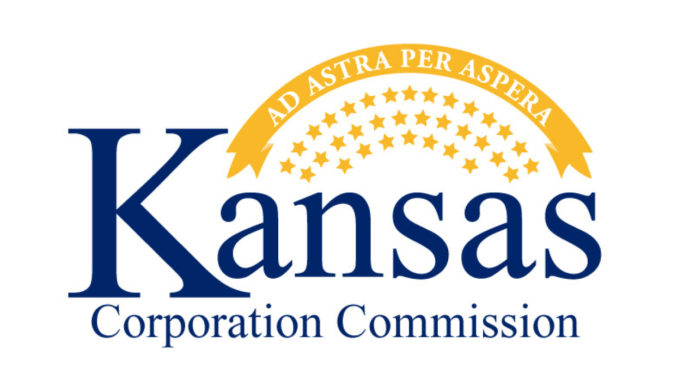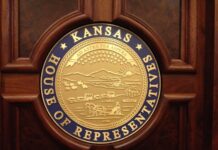State utility regulators are considering the possibility of imposing a new moratorium on utility disconnects during the ongoing COVID-19 pandemic.
The Kansas Corporation Commission on Tuesday directed its staff to explore the possibility of stopping utility companies from cutting off service at a time when COVID-19 cases are on the rise and there is an increasing number of jobless claims.
The KCC directed its staff to file a report and recommend whether a new order stopping service cutoffs should be issued. The new report is due Jan. 8.
“I think there is clearly an argument out there that no level of disconnection is in the public interest during a pandemic,” said Commissioner Andrew French.

“I do think it’s an issue of importance that we should hear more on,” he said.
The KCC also extended an order requiring utilities to offer 12-month payment plans and waive late fees to help residential and small-business customers avoid disconnection.
The original payment plan order was set to expire Dec 31. The KCC’s action Tuesday keeps the order in effect until the COVID-19 pandemic officially ends.
The order applies to all electric, natural gas and water utilities under the KCC’s jurisdiction.
The KCC’s action comes less than a week after a coalition of nonprofit groups — called Build Power MoKan — pleaded for an end to utility disconnects.
The energy justice group, which advocates for the needs of utility customers in Missouri and Kansas, urged the governors of both states to act if utilities failed to respond.
“We’re thankful to see the KCC is investigating this serious problem, but increased protections on utilities can’t come soon enough for those struggling in Kansas with the pandemic,” said Zack Pistora, lobbyist for the Kansas Sierra Club and a member of Build Power MoKan coalition.
“Today’s KCC order should have happened months ago and it appears we’ll have to wait even longer for possibly more protections,” he said.
“When utilities shut people’s power off, it only makes the hardship even worse from a health, safety, and economic standpoint,” he said.
Pistora said stopping disconnections is only part of the solution. He wants service restored to the customers who have already been disconnected.
Evergy revealed last week that it decided to temporarily stop cutting off electric service to residential customers as the number of disconnects for nonpayment escalated.
The company cited the pandemic, the onset of winter and upcoming changes to the company’s billing systems. Its moratorium ends March 1.
Earlier this year, the KCC ordered utility companies not to disconnect customers who were suffering because of the pandemic.
The disconnect order lasted from March 16 through May 31.
And while the state’s employment rate has slid since reaching a 40-year high of almost 12% in April, new jobless claims continue pouring into the state.
There were about 33,000 new unemployment claims filed for the week ending Dec. 5, up from about 25,000 a week earlier.
It was the highest number of new claims filed since April 4 when the pandemic first hit the state.
Before the disconnect order lapsed, the KCC required utilities to offer payment plans of up to 12 months for customers and to waive any late fees.
The KCC staff reported on Tuesday that the payment protections appeared to be working by preventing mass disconnections and holding down the number of customers with delinquent account balances.
The payment plans, regulators said, are “providing customers with protections from mass
disconnects while at the same time allowing customers to make progress towards paying off their delinquent balances.
“Overall, COVID-19 continues to be an issue that is effecting businesses and employment levels and continues to be a pandemic,” the KCC’s staff reported.
“Based on staff’s analysis of the effects of the minimum protections in place, it appears to be working well for both customers and the utilities,” the report said.
The KCC noted that four of the six utilities — Evergy Kansas Central, Evergy Kansas Metro, Black Hills, and Kansas Gas Service — have seen a decline in the number of customers with outstanding delinquent account balances.
Atmos and Liberty-Empire, meanwhile, have experienced an increase in the number of delinquent accounts, the report said.
“Furthermore, the number of net customer disconnections is a small percentage of the
total customers,” the report said.
“This is because a significant majority of customers who are disconnected are subsequently reconnected.”
For example, while 25,610 Evergy Kansas Central customers in the old Westar service area were involuntarily cut off from July through October, almost 80%, or 20,335, of them were subsequently reconnected.
The running number of Evergy Kansas Central residential customers that have
been involuntarily disconnected — and not reconnected — equaled about 5,200 customers as of Oct. 31, or 0.84% of total residential customers.
Meanwhile, Evergy Kansas Central, Atmos, Black Hills and Liberty-Empire have all reported fewer customers with delinquent account balances compared to the same time frame in 2019.
The report paints a little different picture for the amount of money customers still owe.
Both Evergy utilities — the Kansas City metro area and the old Westar area — and Black Hills have reported lower delinquent account balances when compared with the same time period in 2019.
Atmos, Kansas Gas Service and Liberty-Empire reported higher total arrearage balances compared to a year ago, the KCC reported.
The report notes the net number of customers disconnected is below 1% of customers, and about 90% of customers can keep up with the payment plans currently in place.
“Overall, the provisions of the minimum protections appear to be reasonable and working as intended,” the KCC reported.
“With one exception (Liberty-Empire), customer arrearage balances are falling and four
of the six utilities have less active accounts in arrears now than when the reporting began,” the report said.















